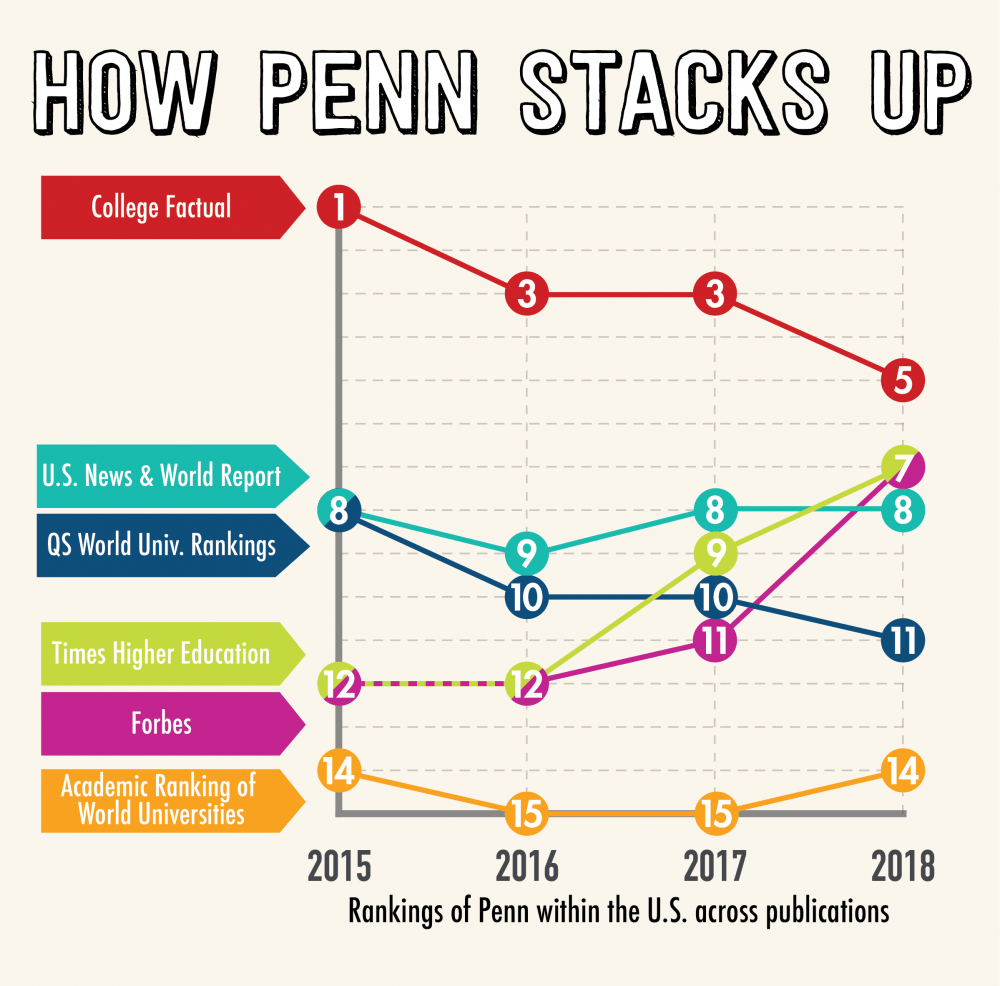Four Penn professors have signed a petition calling on the U.S. News & World Report to alter its rankings by docking points from schools that underpay adjunct faculty members.
Adjunct professors differ from standing faculty members because they are not on track to be tenured, and they generally receive significantly lower salaries, fewer benefits and less job security.
In some extreme cases, adjunct professors at other colleges are homeless or choose to supplement their income with sex work.
English professors Nancy Bentley and Suvir Kaul, Gender, Sexuality & Women’s Studies Program Associate Director Gwendolyn Beetham and Music assistant professor Jim Sykes all signed a petition calling on USNWR to revise its methodology to include all salaries into its "faculty resources" criterion. USNWR currently only includes the salaries of full-time faculty members. Faculty member salaries account for 7 percent of an institution's ranking.
Percentage of full-time faculty versus adjunct faculty currently accounts for 1 percent of a school's USNWR ranking.
Penn Dean of Admissions Eric Furda and Director of Media Relations Ron Ozio declined to comment on the petition.
Bentley signed the petition in the hopes of improving conditions for adjunct professors, but added that the environment at Penn isn't as bad as at other institutions.
"Penn is not as egregious as other universities," Bentley said. "I think Penn at least has as its goal that most of the students who enroll at Penn get taught by full-time professors."
RELATED:
Penn keeps its No. 8 spot in latest U.S. News rankings
Penn lags behind many of its peers in affordability and access rankings
Beetham discovered the petition through her involvement in the National Women's Studies Association. She said the plight of adjunct professors is a gendered issue that tends to disproportionately disadvantage women.
"Women tend to be the ones who are placed in these more contingent roles," Beetham said. "Although women have grown in the percentage of Ph.D.s being received, they’re still not up to the same level as men in terms of full-time faculty."
Adjunct professors often do not have their own offices, which means they have to occasionally hold office hours in public places like coffee shops. They also tend to have fuller course loads than many full-time professors.
"In a lot of places, there are adjuncts who have earned their Ph.D., but to be able to try to put together a livable wage, they have to go teach four, five or six courses, sometimes at different institutions," Bentley said. "Once you’re doing that much travel, once you’re that harried, it’s just hard to give enough time and attention [to students]."
Kaul said that although some adjuncts are qualified instructors, students are generally negatively affected by an over-reliance on adjuncts.
"Ideally, there should be no adjuncts teaching at all," Kaul said. "The only teaching should be done by people on the tenure track in the standing faculty. That’s the way in which you guarantee … not only quality teaching, but also, answerability."
Some within higher education disagree.
"Sometimes you get your best faculty because they’re adjunct faculty," said Brian Taylor, the managing director of the college counseling service, the Ivy Coach. "Maybe they don’t want to be full-time faculty members. Maybe they want to write books; maybe they want to be on MSNBC all day."
Taylor also said he disagrees with the petition signed by the Penn professors, and does not think factoring in part-time faculty salaries into the USNWR would be useful for prospective applicants. However, he pointed out it was "smart" for professors to use the USNWR rankings to draw attention to an issue they feel passionate about.
Bentley agreed. "Administrators do care about these rankings," she said. "If they were forced to actually account for how many adjuncts teach how many classes at a given university, that would be something that administrators might well start paying more attention to."



